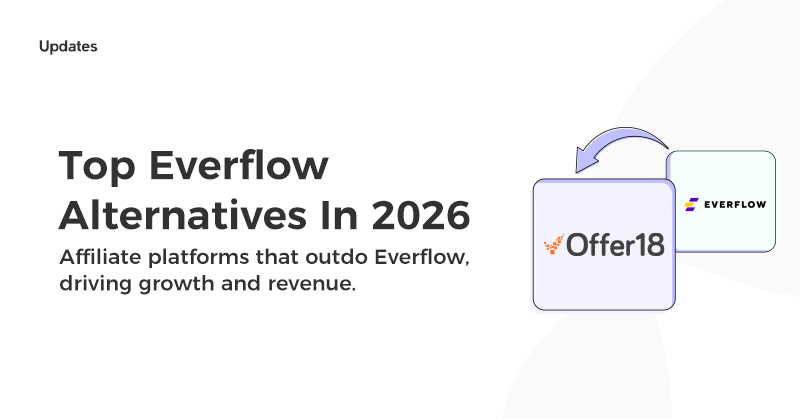The Legit Route To Affiliate Success: Ethics That Are Making It Big
Building affiliate success through trust, honesty, and responsible marketing.
15-Oct-2025

Share
Affiliate marketing is a cracking and economical way to drive sales and revenue for businesses, where winning customer trust is a staple for a brand’s long-term success. However, to make customers believe in your products and for your business to stand the test of time, abiding by legal and ethical guidelines becomes paramount. When brands maintain a high degree of ethical standards, it upholds their integrity and enhances their reputation in the eyes of customers. To do so, brands should ensure that their practices are above board, safeguarding customers' rights and, in turn, maintaining a healthy relationship with them. This means their practices and ideas resonate with customers, short-term gains are given a short shrift, and there is no false advertising in place. Furthermore, the products are top-notch and operate within the stipulated legal boundaries. Thus, there is no trepidation of legal repercussions, and a brand can build a loyal fan following by adding value to the products or services it delivers.
How Does Ethical Marketing Build Up Customer Trust?
Ethical Marketing builds up customer trust in the following ways:
-
Full Disclosure Of Affiliate Agreement With The Brand
Affiliates should be forthcoming in disclosing their relationship with the brand they are promoting. This means they should be unequivocal in making it clear to their audiences that they earn a commission from online sales of products or services generated through their marketing efforts. Merchants, on their part, should also bear responsibility for mandating affiliates to disclose their promotional relationships with the brand.
-
Trust And Transparency Factor That Dominates Between Entities
Entities make a full disclosure of their agreements with brands to their audiences and between themselves, thereby injecting trust, transparency, and credibility into the affiliate system. This way, every party is grounded in honesty from head to bottom, and it is certainly a recipe for success. This engenders goodwill and fosters lasting relationships between the parties involved. It also results in a win-win environment for businesses and consumers alike. Building trust with your audience is not the outcome of any affiliate program; instead, an affiliate marketing program rests on the premise of trust from start to finish.
-
Creation Of Authentic Content Speaks Volumes About The Brand
Furthermore, marketers should also create authentic content that gives a fair opinion about the products or services they advertise. This nurtures the bond between them and potential customers. There should be no ambiguity or indeterminacy, and for any confusion, it should be straightened out, right at the outset.
-
Ditching Fake Reviews And Misleading Claims Or OTT (Over-The-Top) Statements
Fake reviews, false claims, and hyperbolic product benefits offered by marketers gloss over the truth. They are beguiling and throwing dust in customers’ eyes. Hence, this is discouraged to maintain conformity with ethical standards and to stave off any legal consequences. It ultimately makes your system errant, erodes trust and transparency, and gives a major blow to its integrity.
-
High Precedence To GDPR And CCPA Compliance Norm
Additionally, complying with privacy laws such as GDPR (General Data Protection Regulation) and CCPA (California Consumer Privacy Act) is more than just ticking the legal checkbox; rather, it is a stepping stone towards reinforcing trust with your customers. Affiliates must work in conjunction with affiliate networks and programs that prioritize data protection laws.
-
Responsible And Fair Data Collection Plus User Control
Ethical practices ensure fair and square data collection practices. As a marketer, you should explicitly mention the purpose of data collection and the tenure for which it will be retained. This projects a responsible data handling by marketers, which in turn fosters trust. However, first-party data collection is not sufficient; rather, providing users enough leeway to update their preferences remains essential. You should also allow them to opt out or delete their information, which can empower them, giving them enhanced control over their existing data.
-
Winning Trust In The Right Way With Genuine Endorsements And Recommendations
The audience warms up to a marketer’s recommendation when they project a realistic endorsement of a brand or offer an earnest, heartfelt suggestion; hence, authenticity is key. As a marketer, when you elucidate to your audience the difference between genuine recommendations and potentially misleading endorsements, or inform them about fraudulent activities, they will connect more closely to you. Educating them on ethical practices will go a long way in forming a cherished and enduring connection.
-
Ethical Practices While Handling Customer Support
Affiliates should be forthcoming in disclosing their relationship with the brand they are promoting. This means they should be unequivocal in making it clear to their audiences that they earn a commission from online sales of products or services generated through their marketing efforts. Merchants, on their part, should also bear responsibility for mandating affiliates to disclose their promotional relationships with the brand.
The importance of ethical communication is also evident in customer support. This means building a deeper and more personalized connection with your customers through authentic and helpful interactions, which include timely resolution of their queries, providing accurate information, and being empathetic.
Ethical Marketing Strategies That Work For Affiliate Marketing
-
While marketing products or services, you, as a marketer, must thoroughly vet them for quality, as quality matters more than quantity. Ideally, the products must be of high quality, should address the audience’s challenges and align with their interests, such as demographic, psychological, or behavioral.
-
Marketers must prohibit the use of copyrighted or trademarked material in their advertisements without proper consent. This includes images, videos, text, brand names, logos, and other product descriptions. Affiliates must also refrain from sending unsolicited emails in compliance with the CAN-SPAM Act.
-
Social Proof cultivates trust in new customers based on the positive recommendations of existing customers. While statistics suggest that 92% of consumers trust recommendations from friends and family, and over 97% of consumers say online reviews impact their buying decisions.
-
Affiliates must champion those products that they believe in, and merchants must select those affiliates who are closely aligned with their products or services. This establishes a durable connection with the audience that goes beyond transactions. Furthermore, this also fosters a symbiotic relationship between merchants and affiliates that not only drives financial success but also upholds the virtues of the affiliate ecosystem.
-
Honesty in reviews and recommendations is an important tenet that lends credibility to an affiliate’s relationship with their customers. In times when customers place a premium on truthful recommendations and transparency, affiliates must provide unbiased opinions and speak their minds to ensure that their audiences are always well-informed with accurate and valuable information.
-
Affiliates must obtain prior consent from users before they collect their first-party data. This also includes securely storing and transmitting data. This will curb any unauthorized practices, misuse, or breach of data policies, or data manipulation of any nature.
-
Merchants, while adhering to ethical standards, should allocate commissions to affiliates corresponding to their promotional efforts. This will promote fairness in the system and enthuse affiliates to deliver genuine and meaningful results for the long-term profitability of the business.
-
Responsible targeting ensures that products reach audiences where they ring true, fostering positive and ethical engagement. Merchants play a crucial role in laying out clear guidelines for responsible targeting and nudging strategies that promote audience well-being. With such ethical efforts, the industry can only advance onwards and upwards.
-
Social responsibility makes affiliates take a conscious look at their promotional efforts and their impact on society and community well-being. Affiliates and merchants extend their reach to clients across geographies and speak directly to the heart of the social issues they encounter.
-
Ethical practices ensure that conflicts or discord of any sort are resolved amicably by merchants and affiliates. A fair and transparent process must be strictly followed between these entities for reconciling the strained ties between them with due propriety.
-
Ethical practices dictate that affiliates and merchants must create content that appeals to customers of varied interests. Hence, their marketing techniques should be inclusive and accessible to all, thereby tapping into broader market segments and diverse customer groups.
Best Practices To Be Followed In Ethical Affiliate Marketing
-
Advertising products associated with deceptive practices, subpar quality, spurious or suspicious ethical standards erodes the trust between affiliates and marketers, and they must be debarred from indulging in such practices by ethical policies and legal regulations.
-
Affiliates who have lived experience with products can provide panoramic insights about them. Hence, with their direct involvement in the pilot test and use of the product, they can speak vehemently about the pros and cons of the product. It is these experiences and recommendations of theirs that can make or break the reputation of your business.
-
Affiliates, after gaining a nuanced and in-depth understanding of the product, which goes beyond their promotional efforts, can analyze, compare, and offer practical tips and other nuggets that empower consumers to make informed decisions. Furthermore, authentic, valuable, and engaging content helps to build a degree of trust with the audience, the results of which have a direct bearing on the affiliate's reputation, projecting them as a reliable and credible source of information.
-
By adhering to ethical SEO practices, affiliates manage to create a fair and competitive online environment. This best practice dissuades them from using manipulative tactics such as keyword stuffing, cloaking, or artificially inflating backlinks. Responsible SEO enhances the discoverability of the affiliate's content and also maintains the righteousness of the digital marketing ecosystem.
-
All affiliate marketing campaigns must comply with the ethical standards set by the Federal Trade Commission (FTC) and other governing bodies. Affiliates and merchants must lend weight to the significance of relevant laws, guidelines, and ethical standards to ensure compliance and maintain the dignity and moral uprightness of their marketing practices.
-
Both affiliates and merchants should appraise the weight of their partnerships to ensure continued alignment with regulatory standards. Affiliates should diligently evaluate the performance of their merchants, and merchants should also assess the ethical practices followed by their affiliates, fostering an environment where transparency, honesty, and responsible marketing are reinforced.
-
The FTC (Federal Trade Commission) disclosure must be in plain speak so that a common person can understand the financial relationship between the affiliate and the products being promoted. Moreover, it has to be regularly updated to reflect any industry-related changes.
-
As a marketer, you must consider both the upsides and downsides of using a product with a rational and objective mind, so that these details are not lost on the audience. While it is true that you are highly enthusiastic about your product’s strengths, customers must not be kept in the dark when it comes to highlighting the adverse effects of using the product. This fair and impartial attitude bolsters trust with your audience.
-
Regular data audits ensure that your data aligns with evolving privacy laws. Additionally, educating affiliates about the use of their data is equally important, whether it is to offer them personalized recommendations or to enhance their experience.
-
It is advisable to do manual surveillance of trademark registrations, copyright ownership, and usage permissions to ensure any infractions concerning intellectual property rights are strictly prohibited. The shebang, including all content, branding, and creative materials, must be kept under strict vigilance to prevent any misappropriation of protected assets.
-
Strictly adhering to the affiliate program terms and conditions remains binding for every affiliate, as this can have a fallout on the affiliate’s reputation or financial standing. This can lead to losing their commissions, suspension of contracts/agreements, and sabotage of future collaboration with other partners. Thus, their reputation will take a hit, and penalties inflicted can be as grave as ruining their hard-earned money. Their career and reputation are imperiled for their non-conformance to ethical practices.
-
Endorsements and testimonials lend momentum to your affiliate program when they are transparent and above board, while outlining the benefits, limitations, and product features. This will drive continued conversions and encourage engagement with your fan following.
-
Even landing page design is not untouched by ethical standards, which means it should not contain any misleading graphics, and all affiliate links must include proper disclosure of your relationship with the brand. Any faulty, obscene, or plagiarized UI element or text can be a major blowback to your design effort.
-
Any unusual activities, such as a surge in spikes or suspicious trends, may indicate fraudulent practices. These must be curbed at the get-go. Additionally, every click, conversion, or impression must be carefully monitored across channels, thereby thwarting irregularities or inconsistencies. Cookie stuffing or manipulation is another uncharacteristic measure that must be met with strong pushback.
-
Social media platforms have a distinct requirement for disclosures, such that they must avoid indecorous practices in their full disclosures. Social media platforms should not infringe upon platform norms in terms of advertising, affiliate promotion, or content. Likewise, influencers' activities must also be in alignment with FTC guidelines. They should not disguise any unpalatable fact about their promoted products or in their endorsements, affiliate links, or promotional posts under the guise of earning a hefty sum of commissions.
-
Prioritize ethical communication in handling customer support and refund policies. A speedy redressal of customer queries or their gnawing issues demonstrates a commitment to customer satisfaction. Clearly outlining refund policies and ensuring their timely review and updation helps maintain transparency and promotes a culture of loyalty between affiliates and customers.
-
Lastly, the affiliate marketing industry is undergoing a seismic shift driven by constant technological upheaval, evolving marketing trends, and dramatic changes in consumer behavior that are reshaping the way the industry operates. Hence, staying informed by adapting to these changes paves the way for attaining maximum effectiveness and long-term success in your practices.
Conclusion
The rule of thumb is that anything unethical is considered derogatory and must therefore be outrightly discouraged. Unscrupulous practices undermine the brand’s integrity, making customers skeptical about its goodwill and further tarnishing its reputation. Both affiliates and merchants should disclose their agreements and be honest and upfront about their marketing policies and practices. Any concerns about following the ethical norms must be proactively addressed. Additionally, staying informed about changes in the moral landscape and adapting to these changes is invariably important, as it solidifies the brand’s credibility. Affiliate marketing is not straightforward; it comes with strings attached to ethical norms that must be complied with, as they are legitimate.



